Hugely popular, the Lancashire comedian Norman Evans brings his style and comedy act to this film, the title of which was the same as his radio show and his sketches where he used to tell his jokes in a gossipy, inquisitive neighbour style leaning over the garden wall to face the audience – Les Dawson copied this style when he appeared along with Roy Barraclough as Cissy and Ada in his Television Shows
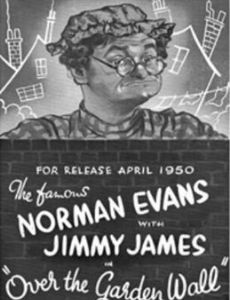
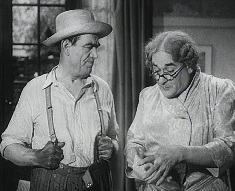
A working class couple are planning to give their only daughter and new GI son-in-law a right Northern welcome. But trouble starts to flare when a young man flirts with their daughter! Jimmy James is often hailed as the ‘comedian’s comedian’. He developed one of the funniest stage routines in variety history and was an inspiration to his fellow comedians. Norman Evans will forever be remembered for his toothless northern housewife character, Fanny Fairbrother, which influenced the young Les Dawson.
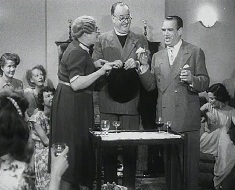
Cast In Alphabetical Order Agnes Bernelle as Val Westwood Alec Pleon as Alec Dan Young as Dan Frederick Bradshaw as Ken Smith Jimmy James as Joe Lawton John Wynn as Tony Harrison Neville Brook as Mr. Smith Norman Evans as Fanny Lawton Sonya O’Shea as Mary Harrison Crew
Directed by John E. Blakeley Written by John E. Blakeley & Harry Jackson Produced by John E. Blakeley
Released 1950 Runtime 94 Minutes
Johnny Blakeley ‘Mancunian Films’ – I remember Michael Parkinson having Peter Sellers on his show who I have to say was one of the very best guests he ever had, and they were both real film fans and they both mentioned Johnny Blakeley and Mancunian Films which they both seemed to remember with great affection.
As Peter Sellers said Johnny Blakeley was not swayed by the critics or by sending a message, he just made films that people wanted to see
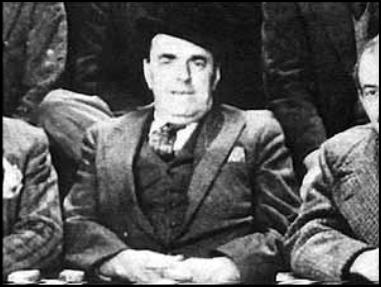
John E. Blakeley is the man responsible for the start of the film career of George Formby as well has many other famous northern variety artists. Although Formby’s first two films were produced in London studios, Blakeley is remembered mainly for the film studio he build in Manchester.
He was born in 1889 and was from a family of cinema owners and film renters in the North West.
Together with other film and theatre owners, he formed a company called Mancunian Films.
Around 25 films were produced over the next 20 years and were distributed through a company called Butchers Films.
Initially he travelled to London to produce his films, renting studios like Riverside at Hammersmith, George Formby’s first films are known to have been filmed at Albany Studios.
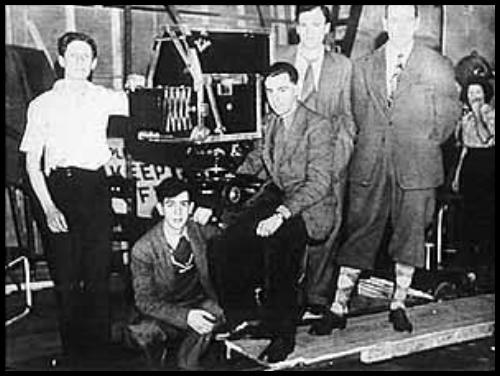
By the end of the Second World War John E. Blakeley’s slapstick comedies were extremely popular in the North of England. Mancunian Films had taken some of the most popular music hall acts from the north and turned them into stars.
These acts included Formby, Frank Randle, Dan Young, Norman Evans, Duggie Wakefield and many more.
After 1945 there was a boom in film production and the cost of studio time in London increased dramatically, John E. Blakeley along with his sons and colleagues decided it was time to take film production home to Manchester. An old Wesleyan Church on Dickenson Road, Rusholme was bought, converted and equipped for £70,000. This became Film Studios (Manchester), the first feature film studio outside London in the post war years. On the 12th May 1947 the studio was formally opened amid a sprinkling of stars and excitement from local residents. The ceremony was attended by George Formby, Dan Young, Frank Randle, Norman Evans and Sandy Powell and George Formby and Sandy Powell made speeches wishing the studios well for the future. Film Studios (Manchester) wasted no time and started work straight away producing a whole string of low budget ‘B’ movies. The surrounding areas of Dickenson and Wilmslow Road was used as a backdrop to many a Mancunian film, as were the local people in crowd or street scenes. Local residents often lent their possessions to the props department who came to beg and borrow to fill up the set.
‘Cup Tie Honeymoon’ was the first film to be made at the studio, starring Sandy Powell, Dan Young, Betty Jumel and Pat Pilkington (later Pat Phoenix, Coronation Street’s Elsie Tanner).
The film, based around the theme of football with scenes shot at Manchester City’s Maine Road stadium, was released to coincide with the beginning of the 1948 football season.
‘The International Circus Revue’ was the next release in 1948. This film featured a local circus troupe from Manchester’s Belle Vue amusements and starred Sonny Burke and Bernard Youens (later Coronation Street’s Stan Ogden).
The International Circus Revue was made using footage from a documentary shot by Mancunian called The Showground of the North, released in 1949. The Showground of the North was a travelogue of Belle Vue’s Zoological Gardens, circus and amusements. This was John E. Blakeley’s only departure from comedy during his career.
During the early 1950’s Tom Blakeley was producer for Mancunian Films. He worked with outside directors on productions such as Never Look Back and Love’s a Luxury (1952), Those People Next Door and Lonely Weekend (1953).
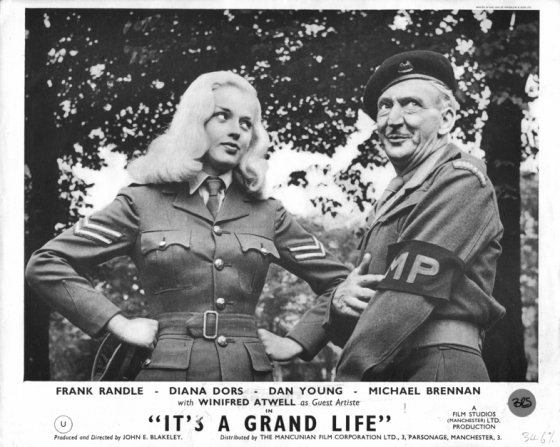
‘It’s A Grand Life’ (1953) was John E. Blakeley’s 22nd and final feature film at the age of 64 and also Frank Randle’s last film before he died of consumption in 1957. This movie brought together Frank with the 22 year old blonde bombshell, Diana Dors, who was already in her 14th film.
The title of this film must surely reflect the quality of the life which John E. Blakeley shared with the workers and stars of Manchester ’s little Hollywood.
Diana Dors could hold her own in any company and with any actor – she was never overawed – only three years later she was co-starring with Victor Mature in the classic ‘The Long Haul’
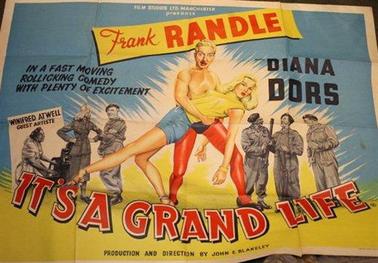
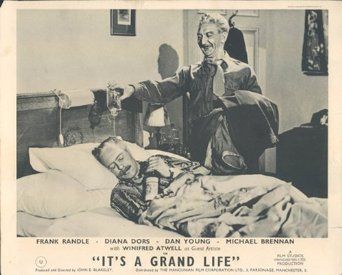
By the mid 50’s the cost of film production had increased whilst the advent of television caused cinema audiences to decline. In 1954 Film Studios (Manchester) was sold to the BBC and the church became the first studio to broadcast outside London in the fifties. Eventually the studio was demolished in 1967.
Through his efforts – and those of his fellow director, the box-office money-spinning Lancashire comedian, Frank Randle – this country now has a memory bank of all those wonderful artistes, who, but for Johnny Blakeley and Frank, would have been lost and forgotten, forever.
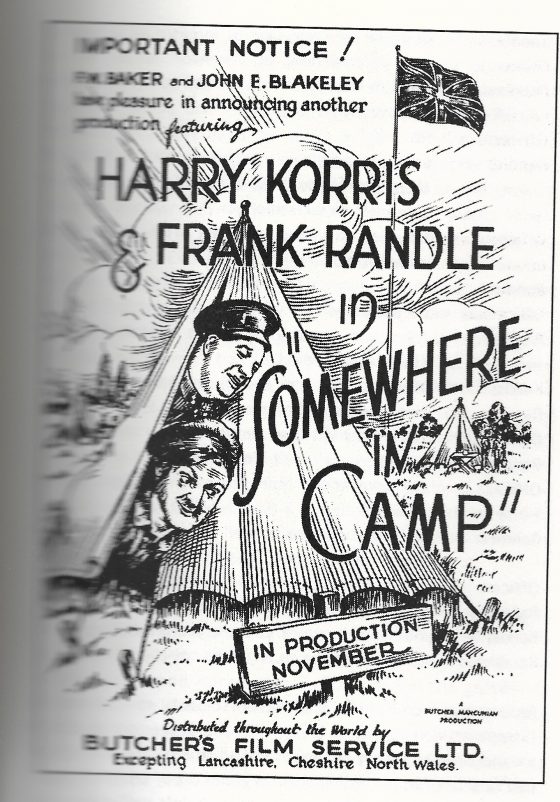
Frank Randle himself made upwards of 10 record-breaking comedies at Mancunian, and working alongside him were stars like the Irish tenor, Josef Locke; Sandy Powell; Duggie Wakefield; the diminutive ‘boy’ comic Jimmy Clitheroe; Hilda Baker; Jimmy Jewel & Ben Warriss; Tessie O’Shea; Harry Korris, Bobby (Enoch) Vincent, of the BBC Home Service, ‘Happidrome’ programme; Jimmy James and Ely Woods; Norman (‘Over The Garden Wall’) Evans; Gladys Morgan, Betty Jumel, Nat Jackley, Gus Aubrey, the black pianist, Winifred Atwell; Anne Ziegler & Webster Booth, the radio singing group, ‘The Kordites’, and a host of other stars, mainly recruited from all the top theatre venues in Blackpool and along the Fylde Coast…not to mention every provincial Variety theatre, within a 50-mile radius of All Saints.
I have to say that in writing this article – which seemed to interest me more as I got into it – I have taken a lot of it from another site about Mancunian Films
Place your comment